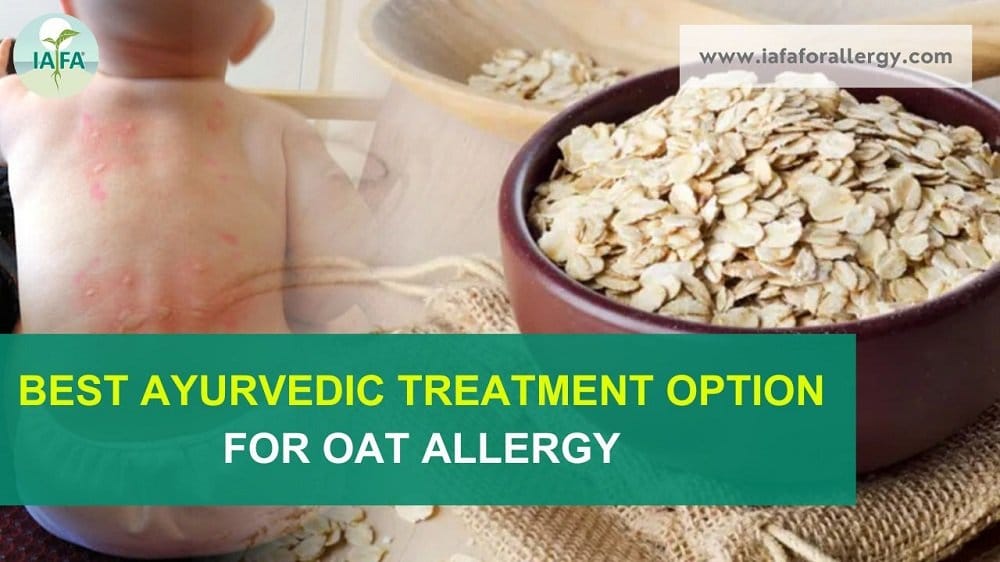If your newfound love for a bowl of oats is followed by feeling bloated or having a runny nose, you might suffer from an oat allergy. The allergic reaction can occur in response to a protein named avenin in the oats. Oat allergy manifests as the antibodies forming in response to a perceived foreign substance inside the oats.
Few people experience the symptoms of this allergy even without being allergic to oats but are allergic to gluten or are suffering from celiac disease. Gluten is present in heat but not in oats, but it could be due to cross-contamination, which causes traces of gluten to be found in oats. Let’s understand oat allergy in detail and enlighten ourselves about oat allergy treatment, including ayurvedic treatment.
How Common is Oat Allergy?
Oat allergy is relatively uncommon but can occur in infants. However, the cross-reactivity with oats is around 33.33% as oats are commonly handled with wheat and other grains containing gluten at the time of processing and foster oat allergy.
Symptoms of Oat Allergy
Some common symptoms of oat allergy are:–
- Skin irritation, itching, and blotchy skin
- Rashes or irritation inside and outside the mouth
- Itching in the throat
- Running nose or stuffiness
- Itching in the eyes
- Nausea
- Vomiting
- Diarrhea
- Stomach ache
- Breathing difficulty
- Anaphylaxis (It is a severe and life-threatening condition in which the patient can lose consciousness)
In young children and infants, oats allergy can also give rise to a condition known as food protein-induced enterocolitis syndrome (FPIES), which can negatively impact the gut. It can cause vomiting, diarrhea, and growth issues.
In addition, oats can also cause atopic dermatitis or skin allergy issues in children if oats are used topically or are applied to the skin.
Ayurvedic Perspective of Oat Allergy
Ayurveda – the oldest healing system, believes that when the elemental energies (doshas), tissues (dhatus), digestive fire (agni), and waste products (mal) are balanced, then it is regarded as the state of health. When there is an imbalance in these elements, a disease or a state of vikriti is manifested.
1. Dosha (Elemental Energies) Imbalance
An individual having pitta dosha dominance is more susceptible to heat-related disturbances. According to Ayurveda, oats are hot, and if a person has vitiated pitta dosha, then the hot food items vitiate it further and cause various diseases.
2. Dhatus (Tissue)
Dhatus or tissues represent the building blocks of the physical framework and have a function to support and maintain the overall well-being and functioning of the body.
3. Agni (Digestive Fire)
Ayurveda believes in the importance of digestive solid fire or agni for proper digestion and assimilation of food. If the digestion is improper, it can result in poor digestive fire and accumulation of toxins or ama, which can result in different health issues.
4. Mala (Waste Products)
Mala allows proper nutrition and removes toxins or wastes from the body. If these mala are not excreted from the body, then the physiological processes inside the body will not function normally, resulting in the formation of toxins. These toxins make the body more susceptible to allergies, and the immune system can also develop sensitivity and fail to identify harmful or foreign substances.
5. Mann (Mental or Emotional Factors)
Mann is critical in Ayurvedic science, and it is believed that if the physiological processes are not running smoothly, it affects the individual’s mental state. If there is an imbalance in the individual’s mental well-being, then the physiological processes are negatively impacted.
With the understanding of the Ayurvedic approach towards health and diseases, we can now move forward in learning more about the oat allergy treatment from an Ayurvedic viewpoint.
Oat Allergy Treatment: An Ayurvedic Approach
As per Ayurvedic principles, the main goal of treatment is to restore the doshas balance through diet and lifestyle modification, implementation of daily and seasonal routines as guided by Ayurveda, herbal support, and detoxification therapies. Furthermore, Ayurveda also advocates using natural herbs and spices, which possess anti-allergic qualities.
One of the most common and most effective herbs is Turmeric, as it is a potent anti-allergic and anti-inflammatory product and is also rich in antioxidants. This helps limit inflammation due to different food products.
The second important herb is Ginger, which effectively decreases the histamine levels in the blood. Histamine produces allergic reactions in the body; therefore, if its concentration decreases, it will help with allergies. Ayurveda focuses on treating the root cause and preventing relapse from a particular health condition.
Ayurvedic Treatment for Oat Allergy
As discussed earlier, the ayurvedic treatment of food allergies like Oat Allergy, involves restoring the balance of the doshas. Moreover, the treatment is individualized, as everyone has a unique body constitution. The interventions include oral medicines, diet and lifestyle modification and detoxification therapies or panchakarma.
Diet and lifestyle modification involves the implementation of strict daily and seasonal routines, as mentioned in Ayurvedic texts. Detoxification or panchakarma helps to eliminate accumulated toxins and maintain the immune system. Nidaan parivarjanam, or avoiding the allergen, is also a management approach that ancient Ayurvedic sages advise.
Oral medications can be in the form of Gulika or Tablets, Churna or Powders, Asavas and Arishtas or Syrups, Kwath and Kashaya or decoction, Vati and Single Herb Capsules. At IAFA Ayurveda®, our team of doctors has conducted extensive research and development to prepare various herbal formulations that are effective in the treatment of oat allergy and other types of food allergies. These herbal formulations are:-
1. Aahar Amrutham Gulika
The herbal combination is infused with the goodness of different herbs like choti dudhi, punarnava, bhoomi amlaki, and shriphal. The medicine helps to maintain healthy digestion and also helps to remove harmful toxins from the body. The medicine also regulates healthy metabolism and removes waste products from the body. According to Ayurveda, poor digestive fire or agni is responsible for most of the diseases therefore it maintains healthy digestive fire and helps in detoxification of the body.
2. Kutajghana Vati
The medicine is intestinal friendly and promotes healthy gut bacteria. The herbal combination boosts healthy digestion and metabolism and helps to distribute nutrition to all the cells and tissues of the body. The medicine helps to combat chronic diarrhea, loose motions, and irritable bowel syndrome. Moreover, it maintains the health of the gut which is the primary site of immune cells and therefore it strengthens the body’s defense mechanism. These tablets are easy to consume and also prevent harmful side effects.
3. Triphala Capsules
Triphala is a traditional Ayurvedic combination of three fruits such as Harad, baheda, and Amla. These capsules are easy to consume and are a good option for those who are unable to consume the combination in powder form. Triphala capsules help to deal with digestive problems including constipation, unclear bowel movements, and acidity. These capsules help to remove harmful toxins from the body and maintain overall health and wellness. The herbal medicine is effective in oat allergy and prevents recurrent attack of the health condition.
Note:- It is always recommended that before using any herbal formulations must consult with an Ayurvedic Physician.
Conclusion
Oats allergy occurs in response to a particular protein present in oats. Although this allergy is uncommon, the symptoms can still be annoying for sensitive individuals. Fortunately, Ayurvedic concepts and methods are effective in treating oat allergy.
If you are stressed as your loved one suffers from oats allergy or any type of allergy, you can contact our diligent team of doctors headed by Dr. Sahil Gupta (Ayurvedic Allergy Specialist, CEO and Founder of IAFA®). IAFA® is one of the most trustworthy and committed institutions to improving the world through its original and holistic approach. Dr. Gupta’s team treats all types of allergies and infections using 100% natural and herbal products.
“We don’t Suppress allergies, but we treat allergies naturally.”
References
Arora, D., & Kumar, M. (2003). Food allergies–leads from Ayurveda. Indian Journal of Medical Sciences, 57(2), 57–63. https://pubmed.ncbi.nlm.nih.gov/14514269/









